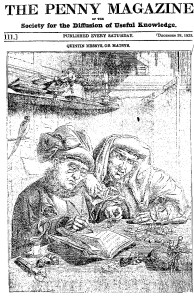Author, ’ Popular Educator,’ Pioneer Populariser of Inexpensive Publications and Publisher.

Charles Knight merits a biography not only for his work with Henry Brougham [see biography] on the publications for the Society for the Diffusion of Useful Knowledge but as a person committed to publishing written material for the wider public. In the early 19th century books and newspapers were incredibly expensive and out of the reach of the majority of the population. Charles Knight with other visionaries e.g. Chamber brothers attempted to produce informative and attractively presented literature to the workers and their families.
Charles Knight was born in Windsor and was apprenticed to his father’s bookselling business. ( One story that is told about his fathers business was that King George 111 came across a copy of Tom Paine’s book ‘The Rights of Man’ in the shop and was not at all pleased about the publication. Subsequently the book was banned and Paine charged with seditious libel). On completion of his apprenticeship Knight entered journalism and became an established author and publisher for the next forty years. When he was asked “sir, what do you travel in?” he replied “in Useful Knowledge, sir”.
In 1825 he developed a plan for a National Library publishing inexpensive books on art, history and science. In 1827 Thomas Brougham appointed him to oversee the publications for the Society of the Diffusion of Useful Knowledge and he became the superintendent of the Society’s material and from 1829 its publisher. The publications provided invaluable information for workers enrolled at the Mechanics’ Institutions and included the following titles: Library of Useful Knowledge (1837+), Penny Magazine (1832-1845), Quarterly Journal of Education (1831-1836). Knight and Brougham appointed a group of highly regarded scholars and business people who were supported by equally high powered members who served on the editorial board and acted as writers for the journals. Below is a copy of the front page of the Penny Magazine of 1833.

Many of the publications were scientific in nature. Initially many of the publications proved popular and profitable but eventually because of excise duty and tax issues very high losses were incurred. For example the Biographical Dictionary lost £5,000 and the Penny Cyclopaedia lost a massive £30,000 of which £16,500 was associated with the paper tax. Inevitably Knight could not sustain such losses and sadly the Society for the Diffusion of Useful Knowledge and its publications ceased. Interestingly the demise of the publications mirrored the fate of the formal lectures staged initially at the Mechanics’ Institutions. For example the Library of Useful Knowledge was seen as being too scientific and assumed prior knowledge that did not exist and as a result proved too difficult for the average worker. In retrospect many of the readers of the publications were from the more skilled and well-off workers but nevertheless the endeavour was a remarkable and brave experiment to bring informative reading material to the masses.
Knight continued in publishing after finishing with the Society. Publications included such titles as The Land We Live In, Local Government Chronicle (1855), Popular History of England (8 volumes 1856-62), a biography of William Caxton and many famous authors. In 1864 he retired as a publisher but continued to write until his death in 1873. He wrote his autobiography ‘Passages of a Working Life during Half a Century’.
Charles Knight was a remarkable individual who helped to make a massive contribution to publishing inexpensive literature as well as being an influential author. He was a member of a small group of popular publishers including the two brothers William and Robert Chambers, John Cassell and Harriet Martineau. Harriet Martineau was a remarkable woman who worked closely with Charles Knight. She was born in Norwich in 1802 and published ‘Illustrations of Political Economy’ in 1832. Later she wrote a number of books on the ‘Poor Law and Paupers’, and a five volume set of ‘Illustrations of Taxation’. Harriet Martineau was a remarkable woman for Victorian times and a unique figure. She was a very productive writer producing thirty-four volumes in just over two years. She was also instrumental in helping to create the Society for Promoting the Employment of Women after writing an article in the Edinburgh Review a publication that was founded by Thomas Brougham. Later in life she delivered lectures to the mechanics in the Lake District. See biography on this website to H Martineau.
Reference:
- Knight. C. ‘Passages of a Working Life.’ 2 volumes. Bradbury. 1864/65.
- Webb. R. K. ‘Harriet Martineau- A Radical Victorian.’ Heinemann. 1960.
- Gray. V. ‘Charles Knight. Educator, Publisher, Writer.’ Ashgate. Aldershot. ISBN-10:07546 5219 X. 2006. An excellent and highly informative account of this remarkable man.

Recent Comments